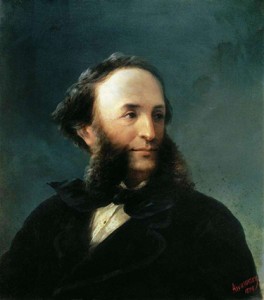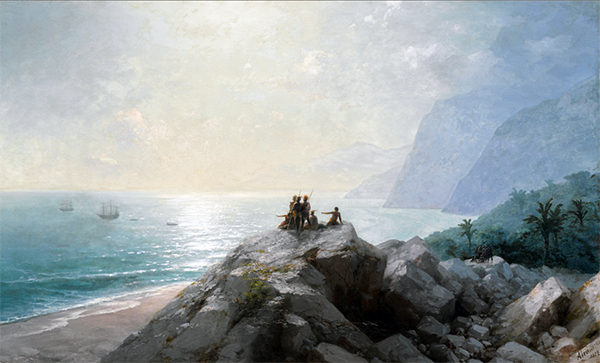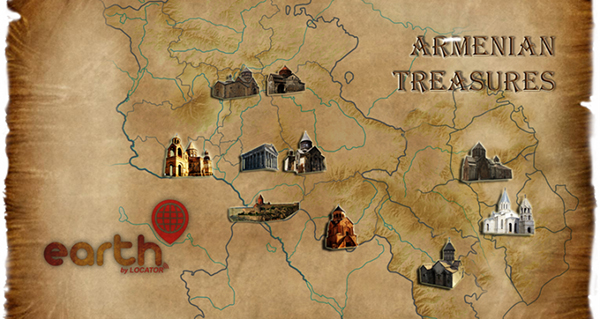Aivazovsky’s “Arrival of the Columbus flotilla to the American coast” (1892)


LONDON — The works of Ivan Aivazovsky and Nicholas Roerich will be the main lots of the Bonhams auction taking place in London on November 26. One of the key lots will be Aivazovsky’s “Arrival of the Columbus flotilla to the American coast” (1892), evaluated 700-900 thousand pounds according to RIA Novosti that the press service.
This work of the great Armenian marine painter is from the series of the five works, devoted to the life of Columbus and was launched in 1888. The work is considered to be one of the most outstanding works of this series.
In 1892, the celebrated artist Ivan Aivazovsky embarked on a trip to the United States for the first and only time in his life. Invited to represent fine art at the 1893 World’s Columbian Exposition in Chicago, the seventy year old artist embraced the opportunity to showcase twenty of his finest paintings. His participation was well received and ensured the success of his contribution to the Columbian Exposition. The present masterpiece was among the most celebrated works exhibited at the Exposition. Arrival of the Columbus flotilla to the American coast belongs to a series of monumental paintings on the life of Christopher Columbus that Aivazovsky began as early as 1888. It is among the grandest and most beautiful of the paintings in the series, depicting the final and most significant stage of Columbus’ challenging journey to the New World: the moment at which the flotilla finally arrived on the shore of America.
Nearly a decade prior to beginning work on his Columbus series, Aivazovsky travelled to Genoa and Florence to research the explorer’s discovery of the New World. Taking note of the master Karl Briullov’s technique of extensive preparatory study of the scenery depicted in his legendary painting The Last Day of Pompeii, the artist closely studied Fifteenth Century ship design, as well as costumes and weapons from the era of Columbus, in preparation for his series of paintings on the subject of the eminent explorer. It is suggested that even as Aivazovsky embarked on his trip to Genoa and Florence in 1879, he was already dreaming of making a future trip to the United States.
Aivazovsky finally completed five large scale paintings on the life of Christopher Columbus in anticipation of the opportunity to exhibit them at the 1893 Columbia Exposition.
Arrival of the Columbus flotilla to the American coast is a splendid example of the artist’s masterful composition and skillful rendering of atmospheric effects. The sky is depicted with remarkable lightness; the airy, transparent clouds add depth to the pastel blue expanse, glowing as if lit from within the center of the canvas. The light plays off the calm waters of the ocean creating a sense of stillness in contrast to the gentle motion of the foamy waves crashing on the sandy coast. To the right, mountainous forms descend into atmospheric perspective past a green stretch of palms, drawing our eyes to the rocky formation in the center of the painting. Two groups of Native Americans pause to look and point at the approaching flotilla; two ships, only their outlines discernible in the distance, stand anchored while two smaller boats carry Columbus’ explorers to the shore of the New World for the first time.
Aivazovsky achieved the remarkable lightness and transparency of his backgrounds by using thin applications of semi-transparent color washes. Consistent with his technique, the sky in the Arrival of the Columbus flotilla to the American coast is the most delicately rendered part of the composition. Working quickly, Aivazovsky would evenly apply a thin wash of color over the prepared ground of the canvas without waiting for it to dry, in order to seamlessly blend the colors to create this stunning effect of airiness. In contrast, the rocky coast is heavy, massive and dark against the pale water and sky.
The work Columbus, encircled by his retinue disembarks at the shore in San Salvador Island’ (originally the largest of these monumental works), was later cut into two parts and sold as two separate paintings by an international auction house in 2006 and 2008. When the second part of the painting was offered at auction, it was incorrectly given the title ‘Arrival of the Columbus flotilla to the American coast.’ It is evident that more accurately, this title as it appeared on Aivazovsky’s handwritten list refers instead to the present painting, recently discovered in a private American collection.
At the 1893 Columbian Exposition in Chicago, Arrival of the Columbus flotilla to the American coast was exhibited at the Russian Pavilion, a monumental architectural masterpiece in itself. Designed by I. Ropet to resemble traditional Russian wooden architecture, it was one of the largest and most impressive structures at the Exposition. Occupying nearly an acre of space, the Pavilion demonstrated a marvel of traditional carving technique and the fanciful decorativeness of Russian architecture. ‘The Official Directory of the World’s Columbian Exposition’ described the Russian contribution to the Fine Arts pavilion as ‘what is probably the best collection of Russian paintings ever shown at a foreign Exposition.’ Aivazovsky’s paintings were exhibited among the ‘great works’ of his contemporaries – Ilya Repin, Henrik Semiradsky and Konstantin Makovsky (Moses P. Handy, The Official Directory of the World’s Columbian Exposition, Chicago.
In addition to attending the 1893 Columbian Exposition, Aivazovsky planned to travel around the United States for approximately five or six months. On October 13, 1892, he arrived with his wife in New York, the first stop on his tour of the United States. The couple then visited San Francisco and Washington, D.C., among other cities. Everywhere they travelled, the artist was greeted with enthusiasm and great public interest. Unfortunately, the trip was cut short and Aivazovsky had to return to Russia before the Exposition opened. Nevertheless, the display of Aivazovsky’s paintings at the Columbian Exposition became one of the most successful international exhibits of his life. The present painting, with its spacious composition, nuanced color palette and detailed scenery brilliantly demonstrates the remarkable imagination and painterly talent of the celebrated Russian master.










